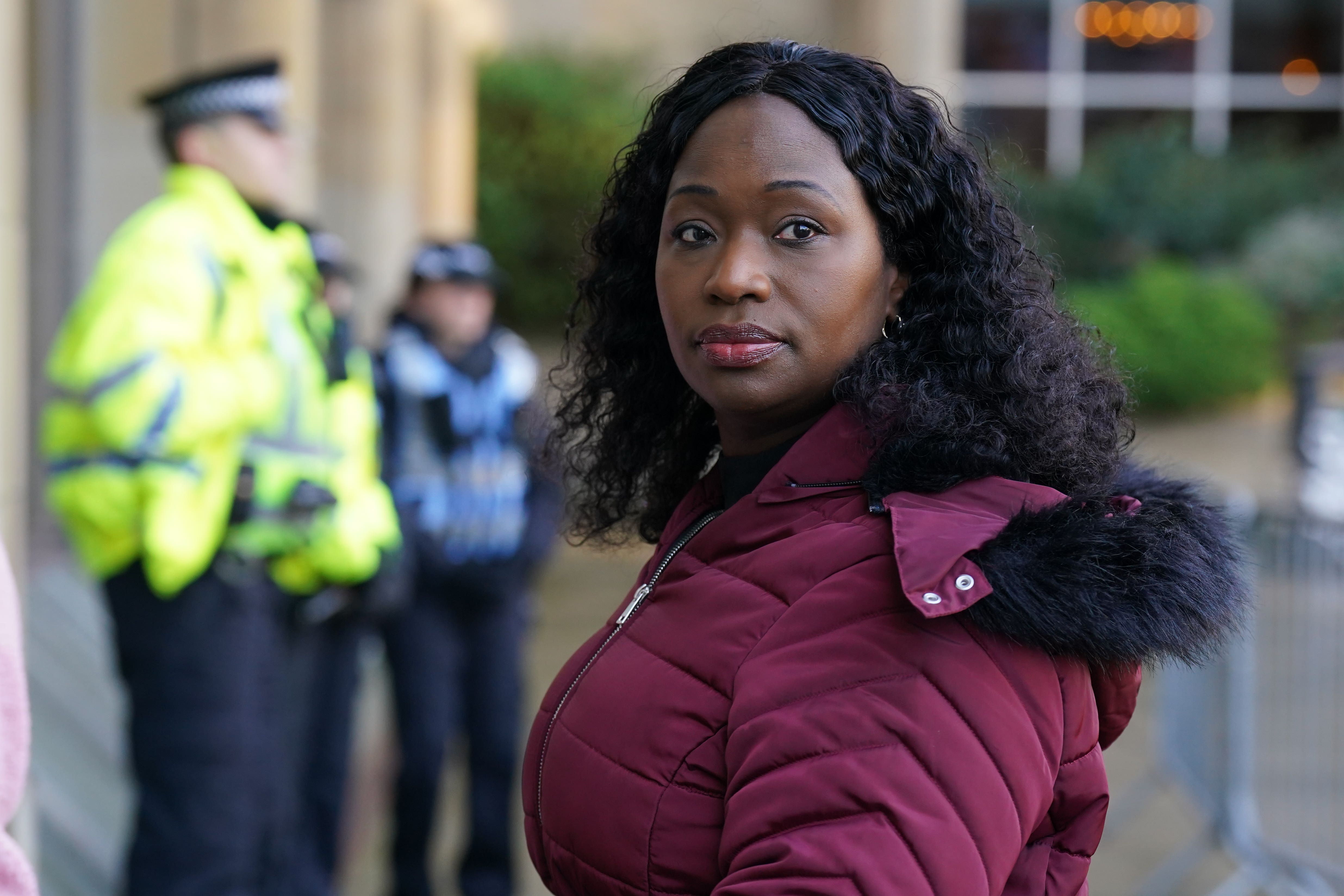Sheku Bayoh family ‘angry’ after police submissions at inquiry
Mr Bayoh’s sister Kadi Johnson said police officers’ lawyers were ‘blaming Sheku for his own death’.

The sister of Sheku Bayoh says his family has been left “angry” by lawyers representing police officers who arrested him, accusing them of “blaming Sheku for his own death”.
Those representing the officers said criticism of them was “wholly unwarranted”, with a lawyer suggesting the father-of-two was to a great extent “the author of his own misfortune”.
Earlier, the family’s legal representative said the 31-year-old was in a “mental health crisis” and should have been dealt with as a medical emergency, but he was instead met with “immediate violence” from the police.
Mr Bayoh died after he was restrained on the ground by six police officers in Kirkcaldy, Fife, on May 3 2015.
He had been seen with a knife in Kirkcaldy on the day of his death but was not in possession of it when police went to arrest him.
On Tuesday, participants in the inquiry into his death began giving oral submissions on the evidence heard so far.
Standing alongside other members of Mr Bayoh’s family, his sister Kadi Johnson spoke briefly to the media following the morning’s submissions.
Asked about the arguments put forward by the police representatives and whether the family’s anger was misplaced, she said: “We’re very angry to hear that.
“Because when they met Sheku he had no knife on him.
“They are blaming Sheku for his own death, but where was their duty to care?
“They did not care for Sheku when they met him in a state where he was experiencing a mental breakdown. They did not help him there.”
Roddy Dunlop KC represented the Scottish Police Federation.
On Tuesday morning he told the inquiry that criticism of the officers “wholly unwarranted” and they did their best in “terrifying” circumstances.
He dismissed claims that police could have waited before intervening, saying such a suggestion was “ludicrous”.
Mr Dunlop said he did not dispute that Mr Bayoh was a “kind, loving, friendly” man but said “that was not the man who was on Hayfield Road” at the time of the incident.
Mr Bayoh was likely experiencing behavioural disturbance as a result of taking drugs, he said, arguing the police had to act in such a situation.
He said: “He (Mr Bayoh) was not killed by the police.
“He died because he created a situation in which he had to be restrained and where he was unable to survive lawful restraint.”
Mr Dunlop said the officers involved had been “lambasted” in the media as a result of the scrutiny they had been under for the last eight years.
Brian McConnachie KC represented Pc Alan Paton.
He said there is “not a shred of evidence” that Mr Bayoh’s race had anything to do with the incident.
Mr McConnachie said: “The death of Sheku Bayoh was an unforeseen tragedy.
“But the reality is that on the evidence put before this inquiry, he was to a very significant extent the author of his own misfortune.”
The inquiry had earlier been told that when the father-of-two died he had the drugs MDMA and alpha-PVP in his system.
Claire Mitchell KC, who represented Mr Bayoh’s family, said racial stereotypes were used in relation to Mr Bayoh soon after his death.
She said that in the media “police sources painted an image of a large black man with stereotypical characteristics of extraordinary strength and dangerousness”.
Ms Mitchell continued: “In relation to the incident itself, Sheku was experiencing a mental health crisis and should have been dealt with as a medical emergency.”
Referring to previous evidence, she said Mr Bayoh was sprayed with incapacitants three times, struck with a baton and forced to the ground within 50 seconds of the first police car arriving at the scene on Hayfield Road.
She continued: “Sheku was brought to the ground in less than 45 seconds of the first police contact, never to get up again.”
She said none of the officers involved had been seriously injured.
Ms Mitchell added: “The process and procedures put in place to allow for assessment of a person and a mental health crisis were ignored. His safety was not considered.
“He ought to have been met with careful consideration and assessment.
“Instead, Sheku was met with immediate verbal then physical violence.”
She said the issue of race “flows as a river through this inquiry”, referring to the chief constable’s recent admission that Police Scotland is institutionally racist.
And she said the family was not given the truth in the aftermath of Mr Bayoh’s death.
The KC said: “In submissions we address where we say that some officers have not provided credible or reliable information to this inquiry, that they have lied.”
Maria Maguire KC addressed the inquiry on behalf of Police Scotland’s current chief constable, Sir Iain Livingstone.
She said the chief constable expressed “regret” over the way the family were informed.
Mark Moir KC, representing the Coalition for Racial Equality and Rights, told the inquiry: “Several of the officers who attended Hayfield Road were motivated by a sense of racial threat”, and added that the “subsequent effects…would have been unlikely to have transpired in the same way had Mr Bayoh been white”.
The inquiry, before Lord Bracadale, continues.
He has said there is still more evidence to be heard and he will not be issuing an interim report.
Subscribe to Independent Premium to bookmark this article
Want to bookmark your favourite articles and stories to read or reference later? Start your Independent Premium subscription today.
